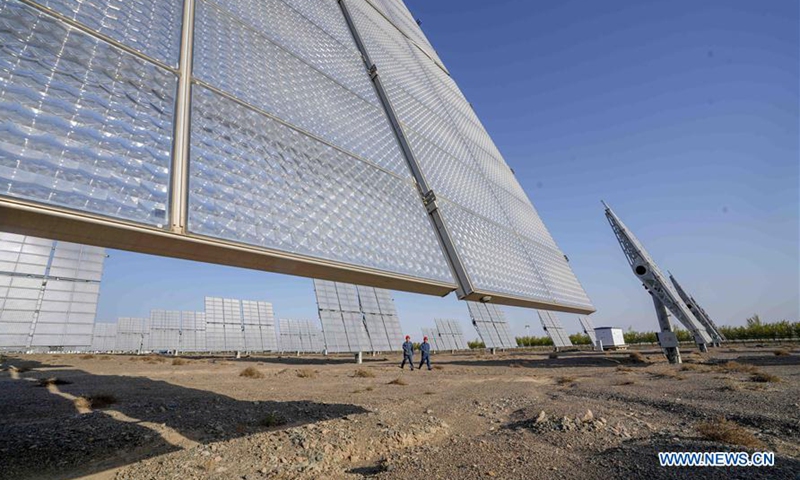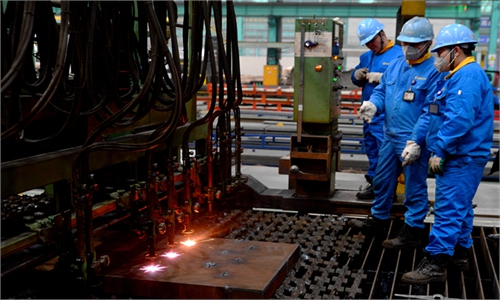Carbon neutrality goal could result in up to $45.8t in investment in next 30 years: economist

Members of staff work at the Shichengzi photovoltaic power station in Hami, northwest China's Xinjiang Uygur Autonomous Region, April 24, 2020. Northwest China's Xinjiang Uygur Autonomous Region transmitted 300 billion kWh of electricity outside the region over a decade, said the State Grid's Xinjiang branch Saturday. The electricity transmission helped China's central and eastern regions reduce about 96 million tonnes of coal use, and cut carbon dioxide and sulfur dioxide emissions by 259.2 million tonnes and 816,000 tonnes, respectively. (Xinhua/Zhao Ge)
China's goal to reach carbon neutrality by 2060 will have a huge influence on the country's macro economy and could generate a total investment of 100-300 trillion yuan ($15.26-45.78 trillion) in the next 30 years, said a prominent Chinese economist over the weekend.
Such a massive investment could also inject fresh momentum into the country's manufacturing sector, Ma Jun, director of the Institute of Finance and Sustainability, said at the Chief Economists Forum held by Tsinghua University online.
Cao Heping, a professor of economics at Peking University in Beijing, told the Global Times on Sunday that investment of at least 100 trillion yuan in the coming years is needed, as the task of carbon neutrality requires the upgrading of the national economy as a whole to deal with carbon emissions.
According to a report jointly released by the IFS and Hillhouse Capital Group in March, China's goal of achieving carbon neutrality faces challenges such as the country's growing energy demand along with comparatively fast GDP growth, difficulty in transforming its coal-driven power supply, and barriers to using its low-carbon technology breakthroughs in the transport, industry and construction sectors.
However, experts are confident that China can achieve its carbon neutrality goals on time, given the central government's strong policy enforcement, as well as industries and enterprises' active responses.
The China Iron and Steel Association said on Saturday that the industry will strive to reach a carbon peak by the end of the 14th Five-Year Plan period (2021-25) by cutting crude steel output, boosting low-carbon technology breakthroughs and using imported steel, among other measures.
Promoting carbon neutrality will help China seize the historic opportunity of a new industrial revolution, Lu Zhengwei, chief economist at Industrial Bank Co in Shanghai, said at the Chief Economists Forum.
Many countries, including China, have issued blueprints to boost carbon neutrality, with details yet to be revealed. "New investment demand will be unleashed once there is a national investment quota, while various industries and local governments can earnestly fulfill their responsibilities," Lu said, noting that investment driven by carbon neutrality could lead the sluggish global economy out of the plight of insufficient demand.
China has been continuously expanding international cooperation in new energy to help fight global climate change. The country's hydropower facilities are widely distributed in many countries and regions, and Chinese companies provide more than 70 percent of the solar photovoltaic equipment to the international market, Zhang Jianhua, head of the National Energy Administration, told a press briefing on March 30.
Meanwhile, China's investment in renewable energy projects in countries and regions along the Belt and Road Initiative (BRI) continues to increase and promote advanced, green energy technologies in less developed countries, he said.
Cao said that China and other economies, especially the US and the EU, can deepen cooperation in a variety of aspects like nanotechnology, new energy and new system integration for carbon neutrality.
"Countries will find that they need unprecedented cooperation for the global initiative," said Cao.



